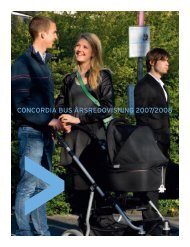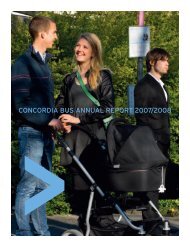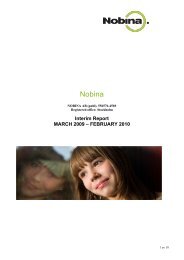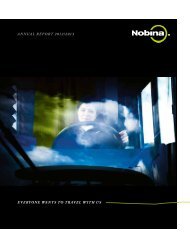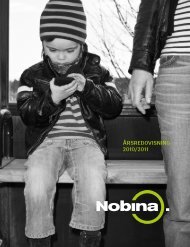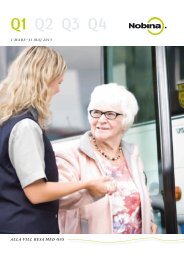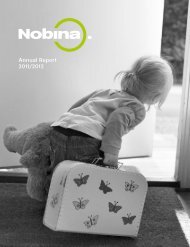Annual Report 2010/2011 - pdf 7.05 MB - Nobina AB
Annual Report 2010/2011 - pdf 7.05 MB - Nobina AB
Annual Report 2010/2011 - pdf 7.05 MB - Nobina AB
You also want an ePaper? Increase the reach of your titles
YUMPU automatically turns print PDFs into web optimized ePapers that Google loves.
NOBINA – respONsIBIlItY<br />
responsible for the environment and<br />
safety – a part of our mission<br />
<strong>Nobina</strong>’s business concept is based on responsibility – for the environment and safety,<br />
for employees and customers. As interest in sustainability issues increases, more and<br />
more people are choosing to travel on public transport, and the more skilled <strong>Nobina</strong><br />
becomes at taking care of the environment by having filled buses and more beneficial<br />
driving, the better the Group’s margins. responsibility is profitable.<br />
PrINCIPLE – ENVIrONMENt AND SAFEty<br />
ArE A NAtUrAL AND PrOFIt<strong>AB</strong>LE PArt<br />
OF OUr BUSINESS CONCEPt<br />
The environment, safety and quality are the<br />
most important areas of responsibility for<br />
<strong>Nobina</strong>, and these three issues have a highly<br />
natural correlation. The more people that<br />
travel by public transport, the better it is for<br />
the environment. And the better the quality<br />
and the higher the safety that <strong>Nobina</strong> offers<br />
on its trips, the more people will want to<br />
travel collectively with <strong>Nobina</strong>. The company<br />
works actively, systematically and integrated<br />
with these matters, accordingly, with<br />
a goal to be one of the most environmentally<br />
compatible alternatives for public transports<br />
and long-distance bus travel.<br />
As a Nordic market leader in public transports<br />
by bus, <strong>Nobina</strong> has significant opportunities<br />
to impact the environment in a positive<br />
manner. In traffic, not only new fuels but also<br />
new technologies, effective maintenance and<br />
economic driving contribute to increased<br />
sustainability. The greatest environmental<br />
advantage, however, is created through fully<br />
occupied buses. It is also more profitable,<br />
which creates opportunities for additional<br />
efforts focused on sustainability. Environmental<br />
questions are coordinated with the development<br />
of processes, services and quality<br />
issues so that long-term value is created for<br />
all interests.<br />
PrIOrItIzINg – grEAtESt rISk FIrSt<br />
<strong>Nobina</strong>’s safety policy states that the company<br />
should be a role model for traffic.<br />
A high level of safety is fundamental to the<br />
entire company’s traffic and all other opera-<br />
28 NOBINA | ANNuAl repOrt <strong>2010</strong>/<strong>2011</strong><br />
tional activities. Punctuality is a key parameter<br />
for the everyday bus trip, but safety and<br />
security have the highest priority, even<br />
higher than comfort convenience. Safety<br />
work is conducted systematically and integrated<br />
with other areas of business operations.<br />
A Group-wide safety council was<br />
established in 2008.<br />
In the long-term perspective, <strong>Nobina</strong><br />
needs to utilize its resources in the best possible<br />
way in order to be competitive and limit<br />
its impact on the environment. <strong>Nobina</strong><br />
reviews its environmental and safety goals at<br />
least once a year when the business plan is<br />
updated. Continuous environmental audits<br />
are conducted to analyze the company’s<br />
environmental work and its results.<br />
In Norway and Finland, <strong>Nobina</strong> has held<br />
ISO 14001 certification for several years. In<br />
the Swedish market, work is now in progress<br />
to certify <strong>Nobina</strong> Sweden’s environmentalmanagement<br />
system under the same standard.<br />
All traffic areas in Stockholm were certified<br />
during <strong>2010</strong>. Swebus, with its focus on<br />
the consumer market, has opted instead to<br />
meet the standards of the Swedish Society<br />
for Nature Conservation’s Good Environmental<br />
Choice labeling. At the beginning<br />
of <strong>2011</strong>, Swebus was named Sweden’s third<br />
best traffic company in terms of environmental<br />
work and social responsibility, by the<br />
Sustainable Brands trademark survey. The<br />
survey asked consumers to rank the most<br />
sustainable brands in the Swedish market,<br />
based on the UN’s Global Compact, which<br />
addresses corporate responsibility for the<br />
environment, human rights, collective bargaining<br />
and suppression of corruption.<br />
In 2008, the Environmental Council was<br />
formed comprising the environmental managers<br />
of the Group’s various companies. The<br />
aim was to contribute to formulating, communications<br />
and establishing environmental<br />
objectives that reflect more clearly <strong>Nobina</strong>’s<br />
ambitions in this area and create effective<br />
procedures for this program throughout the<br />
Group. Work was also started to review the<br />
environmental issues faced by the operations,<br />
which included an extensive survey<br />
and a series of investments in proprietary<br />
depots throughout the Nordic region. Group<br />
management decided on an aggregate list of<br />
157 environmental aspects, translated them<br />
into environmental risks and resolved on a<br />
prioritization of the five greatest risks: energy<br />
consumption at the depots, environmental<br />
requirements in conjunction with purchase,<br />
environmental expertise in the organization,<br />
the utilization of fuel for vehicles and particle<br />
emissions. The UN framework convention<br />
for environmental impact establishes<br />
that greenhouse gases are not permitted to<br />
increase in a manner that makes them harmful<br />
to the environment. Sweden, for example,<br />
has a national environmental objective stating<br />
that average emissions between 2008 and<br />
2012 should be 4% lower than emissions in<br />
1990. Similar targets have been established<br />
for particles that are harmful to inhale and<br />
that are found on the road.



